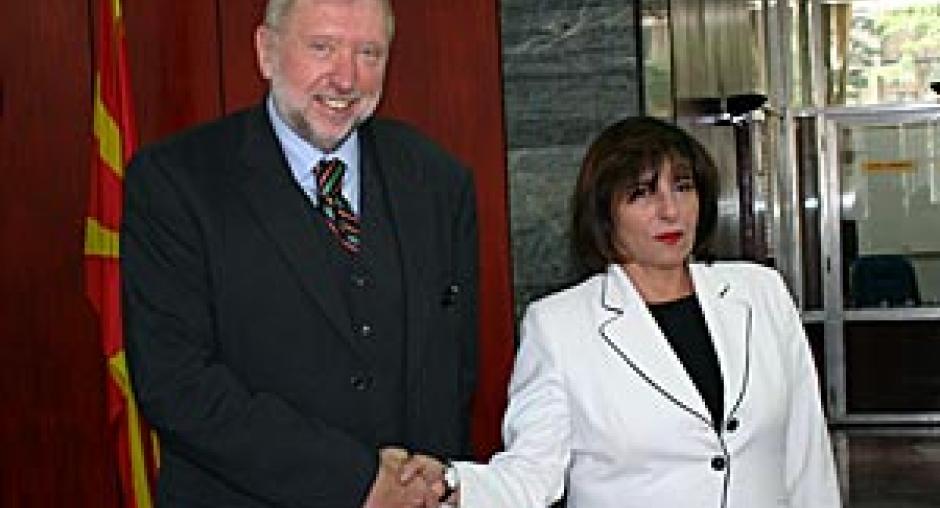Newsroom
OSCE Chairman underlines importance of reforms during visit to Skopje
SKOPJE 5 October 2005

(OSCE/Samir Ljuma)OSCE Chairman-in-Office Dimitrij Rupel (left) is greeted by Foreign Minister Ilinka Mitreva during his visit to Skopje, 5 October 2005. (OSCE/Samir Ljuma) Photo details
SKOPJE, 5 October 2005 - During a day-long visit to Skopje, the OSCE Chairman-in-Office, Slovenian Foreign Minister Dimitrij Rupel discussed the progress of democratic reforms in key areas relating to the Ohrid Framework Agreement of 2001, which ended the short conflict in the country.
After meetings with President Branko Crvenkovski, Prime Minister Vlado Buckovski, Vice Prime Minister Musa Xhaferi, and Foreign Minister Ilinka Mitreva, as well as key opposition leaders, the Chairman-in-Office said the OSCE would continue to assist the Government in its efforts to implement the reform agenda outlined at Ohrid.
"The OSCE stands ready to continue its support in the field of strengthening rule of law, decentralization, capacity and confidence building, election processes and inter-ethnic relations," he emphasized.
He also expressed his satisfaction with the adoption of all legislation amendments foreseen by Ohrid, but recalled the challenges of reforms still underway in areas such as decentralisation, the judiciary and election process.
"Successful decentralisation requires co-operation from all institutions involved, including the active participation of citizens," said Minister Rupel. "Transparent and efficient local government will eventually benefit all members of society."
He expected that free and fair parliamentary elections would help the country on the road to stability and democratic development and so he was pleased that the recommendations made by the OSCE Office of Democratic Institutions and Human Rights have been included in ongoing election reforms.
"Efforts to finalize the reform of election legislation in time for next year's parliamentary elections should be a priority, but in the end it requires political will from all the political parties, to ensure that the election process is held in accordance with OSCE commitments", he added.
The Chairman welcomed the efforts of the national authorities to establish an independent judiciary, strengthen the rule of law and adopt the 'National Strategy on the Reform of the Judiciary.' He was confident, he said, that proposed amendments to the Constitution, if implemented correctly, would advance the process.
Minister Rupel and his counterpart, Foreign Minister Mitreva, also discussed progress made by the country in achieving the standards required for integration into the Euro-Atlantic structures.
After meetings with President Branko Crvenkovski, Prime Minister Vlado Buckovski, Vice Prime Minister Musa Xhaferi, and Foreign Minister Ilinka Mitreva, as well as key opposition leaders, the Chairman-in-Office said the OSCE would continue to assist the Government in its efforts to implement the reform agenda outlined at Ohrid.
"The OSCE stands ready to continue its support in the field of strengthening rule of law, decentralization, capacity and confidence building, election processes and inter-ethnic relations," he emphasized.
He also expressed his satisfaction with the adoption of all legislation amendments foreseen by Ohrid, but recalled the challenges of reforms still underway in areas such as decentralisation, the judiciary and election process.
"Successful decentralisation requires co-operation from all institutions involved, including the active participation of citizens," said Minister Rupel. "Transparent and efficient local government will eventually benefit all members of society."
He expected that free and fair parliamentary elections would help the country on the road to stability and democratic development and so he was pleased that the recommendations made by the OSCE Office of Democratic Institutions and Human Rights have been included in ongoing election reforms.
"Efforts to finalize the reform of election legislation in time for next year's parliamentary elections should be a priority, but in the end it requires political will from all the political parties, to ensure that the election process is held in accordance with OSCE commitments", he added.
The Chairman welcomed the efforts of the national authorities to establish an independent judiciary, strengthen the rule of law and adopt the 'National Strategy on the Reform of the Judiciary.' He was confident, he said, that proposed amendments to the Constitution, if implemented correctly, would advance the process.
Minister Rupel and his counterpart, Foreign Minister Mitreva, also discussed progress made by the country in achieving the standards required for integration into the Euro-Atlantic structures.
